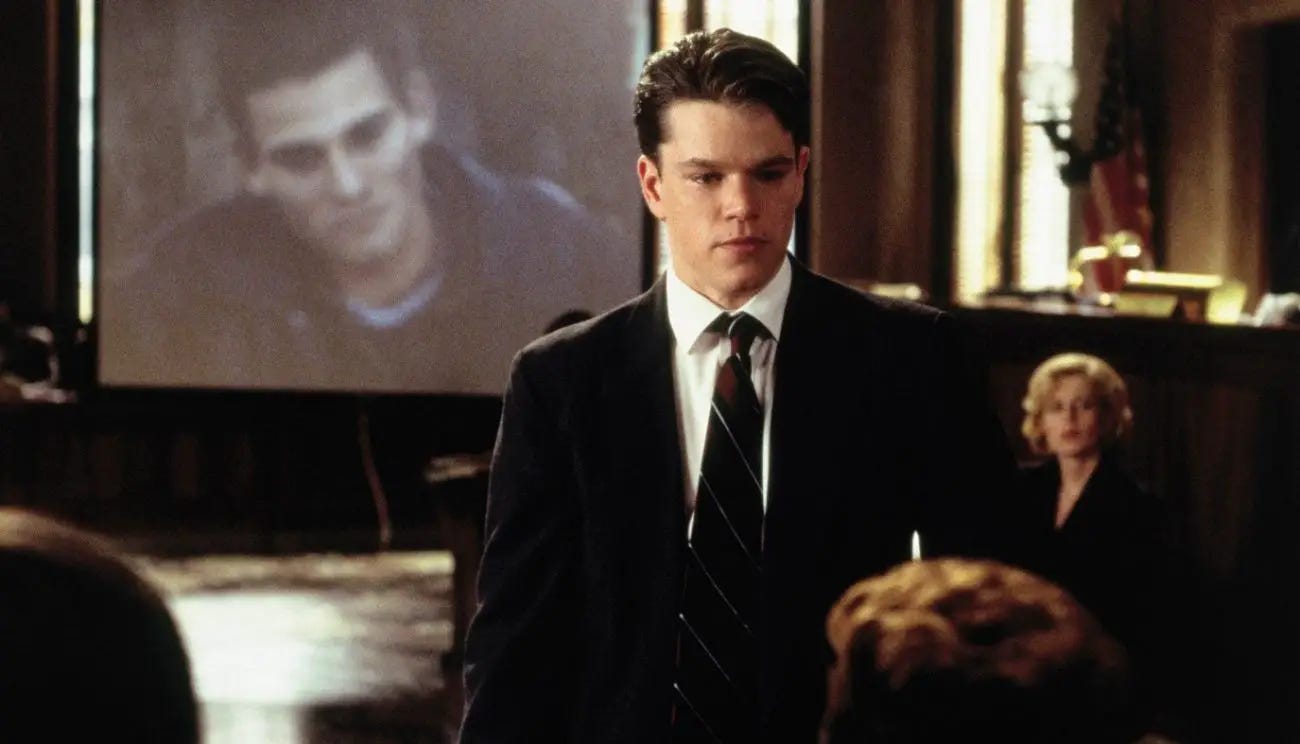Working the System: On Francis Ford Coppola's 'The Rainmaker'
The great director's last Hollywood film may have been a mercenary project, but he got something more out of it.
For the iconoclastic young directors who ruled Hollywood in the ‘70s, that glorious stretch where the inmates ran the asylum, there’s no greater illustration of the “where it started/how it’s going” phenomenon than the 1990s, when several of them took a shot at adapting a John Grisham legal thriller. Between the two of them, Sydney Pollack and Alan J. Pakula had made a trifecta of essential post-Watergate paranoid thrillers, with Pollack’s Three Days of the Condor and Pakula’s The Parallax View and All the President’s Men. They settled for The Firm and The Pelican Brief, respectively. Robert Altman, who always liked to modernize and reinvent genres like the Western (McCabe and Mrs. Miller) and the noir (The Long Goodbye), took a crack at the courtroom drama with The Gingerbread Man. And Francis Ford Coppola, whose boom-and-bust career occasionally had him seeking for-hire projects, tackled The Rainmaker.
Grisham’s formulaic bestsellers weren’t worthy of any of these directors, but there’s a satisfying, hardcover screenplay quality to them and you can see how good filmmakers might talk themselves into it. Grisham liked to set up legal David vs. Goliath scenarios where a scrappy, idealistic, fresh-out-of-law-school hero squares off against conspiratorial forces much larger than himself. Pollack and Pakula had made such movies before. It was abundantly clear that Altman didn’t care much about satisfying the requirements of a traditional legal thriller, but The Gingerbread Man, based on an original Grisham script, allowed him to make a modern Southern gothic in Savannah, Georgia. Grisham’s work may have been generic, but at least it was malleable.
When Coppola got around to directing The Rainmaker, he was unusually up front about it being a mercenary project, to the point where the film was officially titled John Grisham’s The Rainmaker, in case there was any confusion over who was responsible for it. Here’s what he told Roger Ebert at the time:
“I’m out of the dire financial straits, and with this movie, I’m ahead—which is why I did it. I’ve made my family secure with the wine business and so with the money I’ve made on The Rainmaker, I have my wife’s permission, everyone’s permission, to invest in my own next movie. The only way you can make unusual movies is if you put your money where your mouth is.”
That was over 26 years ago, and it was the last time Coppola has worked with a major studio and the last time he worked at all until a full decade later, when he self-financed 2007’s historical/philosophical fantasy Youth Without Youth and made two more independent features after that, 2009’s luxuriant Tetro and 2011’s personal horror experiment Twixt. His relationship with major studios had been tense in the best of times, as any accounting of The Godfather will attest, and there’s an exhausted quality to The Rainmaker, as if he was going out with a whimper.
Yet even in a compromised situation adapting a novel he picked up at the airport, Coppola did find himself in The Rainmaker, which may not be as zesty as The Firm, but now seems like the sturdiest and most sincere adaptation of a Grisham novel. It’s also the clearest picture of a health care battle that was lost in the Clinton administration and wouldn’t be taken up again until Obama spent every last dime of his political capital to change the law. There is no more imposing case of powerful interest groups asserting their will over the welfare of ordinary people than the American health care system, and that’s where Coppola, a champion of the underdog, wedges into the story. Though it’s far less personal than, say, his vastly underrated 1988 film Tucker: The Man and his Dream, the basic dynamics are the same, as Coppola follows another naive idealist who’s up against an industry machine. It’s the story of Coppola versus Hollywood, too.
Keep reading with a 7-day free trial
Subscribe to The Reveal to keep reading this post and get 7 days of free access to the full post archives.




